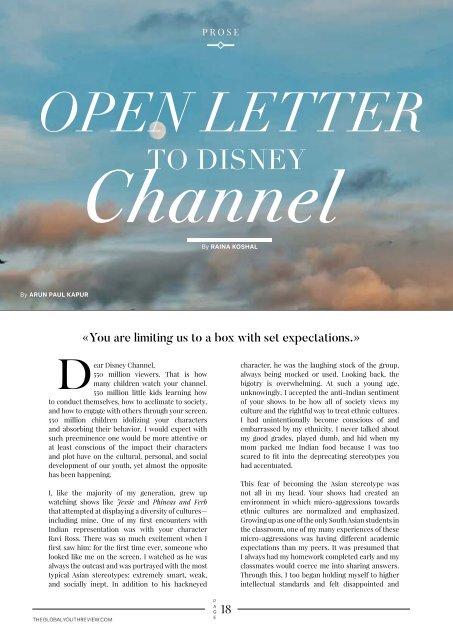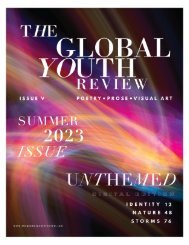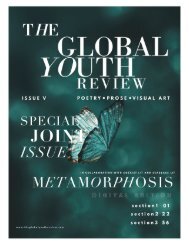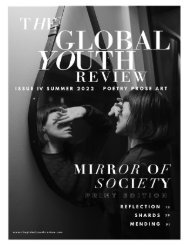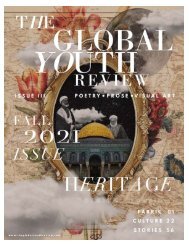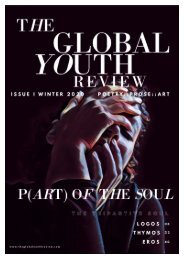ISSUE II: Odyssey
"Odyssey" is The Global Youth Review's second issue, whose structure is loosely based on Homer's "Odyssey" and consists of three chapters: 1) Dawn, 2) Affliction, and 3) Afterglow. We warmly welcome you into a space filled with talented creatives hailing from over 20 countries, all united in their efforts to express through literature the various emotions, ideas, and thoughts that defined their 2020. Designed by Sena Chang
"Odyssey" is The Global Youth Review's second issue, whose structure is loosely based on Homer's "Odyssey" and consists of three chapters: 1) Dawn, 2) Affliction, and 3) Afterglow. We warmly welcome you into a space filled with talented creatives hailing from over 20 countries, all united in their efforts to express through literature the various emotions, ideas, and thoughts that defined their 2020. Designed by Sena Chang
You also want an ePaper? Increase the reach of your titles
YUMPU automatically turns print PDFs into web optimized ePapers that Google loves.
PROSE<br />
PROSE<br />
OPEN LETTER<br />
By ARUN PAUL KAPUR<br />
TO DISNEY<br />
Channel<br />
«You are limiting us to a box with set expectations.»<br />
Dear Disney Channel,<br />
550 million viewers. That is how<br />
many children watch your channel.<br />
550 million little kids learning how<br />
to conduct themselves, how to acclimate to society,<br />
and how to engage with others through your screen.<br />
550 million children idolizing your characters<br />
and absorbing their behavior. I would expect with<br />
such preeminence one would be more attentive or<br />
at least conscious of the impact their characters<br />
and plot have on the cultural, personal, and social<br />
development of our youth, yet almost the opposite<br />
has been happening.<br />
I, like the majority of my generation, grew up<br />
watching shows like Jessie and Phineas and Ferb<br />
that attempted at displaying a diversity of cultures—<br />
including mine. One of my first encounters with<br />
Indian representation was with your character<br />
Ravi Ross. There was so much excitement when I<br />
first saw him: for the first time ever, someone who<br />
looked like me on the screen. I watched as he was<br />
always the outcast and was portrayed with the most<br />
typical Asian stereotypes: extremely smart, weak,<br />
and socially inept. In addition to his hackneyed<br />
By RAINA KOSHAL<br />
character, he was the laughing stock of the group,<br />
always being mocked or used. Looking back, the<br />
bigotry is overwhelming. At such a young age,<br />
unknowingly, I accepted the anti-Indian sentiment<br />
of your shows to be how all of society views my<br />
culture and the rightful way to treat ethnic cultures.<br />
I had unintentionally become conscious of and<br />
embarrassed by my ethnicity. I never talked about<br />
my good grades, played dumb, and hid when my<br />
mom packed me Indian food because I was too<br />
scared to fit into the deprecating stereotypes you<br />
had accentuated.<br />
This fear of becoming the Asian stereotype was<br />
not all in my head. Your shows had created an<br />
environment in which micro-aggressions towards<br />
ethnic cultures are normalized and emphasized.<br />
Growing up as one of the only South Asian students in<br />
the classroom, one of my many experiences of these<br />
micro-aggressions was having different academic<br />
expectations than my peers. It was presumed that<br />
I always had my homework completed early and my<br />
classmates would coerce me into sharing answers.<br />
Through this, I too began holding myself to higher<br />
intellectual standards and felt disappointed and<br />
stressed by my failure to reach them. My “small”<br />
accomplishments never impressed my peers and<br />
started to lose my appreciation as well.<br />
It is intriguing to think about the similarity between<br />
Ravi and the character Baljeet from Phineas and<br />
Ferb. The issue with having the only two South Asian<br />
characters in your network be portrayed as perfectly<br />
fitting into the Asian stereotype of awkward and<br />
smart, having thick Indian accents, and being<br />
disrespected is that it creates connections for the<br />
viewer that leads to unconscious stereotyping and<br />
groupings of South Asians. You are limiting us to a<br />
box with set expectations.<br />
One of Ravi’s greatest characteristics was his accent.<br />
Perhaps if you had glorified Indian accents as you do<br />
French or British, mocking Indian accents would not<br />
be normalized or tolerated. What particularly angers<br />
me is that with the misrepresentation of my culture<br />
and with the mocking of our accents, you couldn’t<br />
even correctly pronounce your characters’ names<br />
- conveying to an entire generation that the bare<br />
minimum of respecting one's name is unnecessary.<br />
Now, having a corrected perception of Indian culture,<br />
I am able to recognize the direct impacts of your<br />
channel to my life and equally to that of my peers.<br />
I have talked about Ravi from Jessie but the show<br />
contains many other stereotypes as well: Emma is<br />
presented as the shallow, rich, dumb blond, Zuri as<br />
the loud, sassy black girl, and Luke as the popular<br />
but dumb and messy white boy. It doesn’t stop there:<br />
the spinoff, Bunk’d, has Tiffany Chen who is an Asian<br />
who plays the violin, is always worried about her<br />
studies, and has strict parents. And this is just one<br />
show. I simply can’t understand why it is acceptable<br />
to have shows that perpetuate such stereotypes that<br />
terrifyingly overpower and categorize our youth by<br />
their looks and ethnicity, stunting their individuality<br />
and creating unnecessary apprehensions.<br />
So, Disney Channel, as a fifteen-year-old Indian<br />
American I have experienced normalized microaggressions<br />
and direct stereotyping an unacceptable<br />
amount of times and I blame a large portion of this<br />
normalization on you. It breaks my heart that my<br />
journey to becoming proud and confident of my<br />
identity was so long and full of doubt. When I told<br />
my friends about this letter, they had their own<br />
experiences and thoughts to add- all my friends, of<br />
different cultures and backgrounds, had faced some<br />
sort of mistreatment that they correlated as a result<br />
of what your network presents.<br />
My hope is that you can work towards more<br />
" It breaks my heart<br />
that my journey to<br />
becoming proud<br />
and confident of my<br />
identity was so long<br />
and full of doubt."<br />
respectful and correct representations of all ethnic<br />
cultures so future generations don't feel the need to<br />
hide parts of their identity to fit in. I do recognize<br />
these efforts in new shows like Mira, Royal Detective;<br />
I appreciate how it displays the beauty of Indian<br />
culture and there is a South Asian main character<br />
who is well rounded. But in order to move past shows<br />
that were not as cognizant, I feel it is necessary to<br />
recognize the faults and ignorance of them- these<br />
shows are still streamed on your network and still<br />
do affect our youth.<br />
Sincerely, Raina Koshal<br />
By ARUN PAUL KAPUR<br />
BMDDIGITAL.COM<br />
P<br />
A<br />
G<br />
E<br />
18<br />
P<br />
A<br />
G<br />
E<br />
19<br />
BMDDIGITAL.COM


